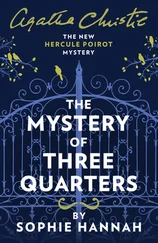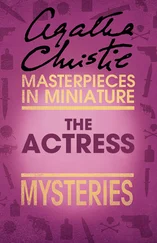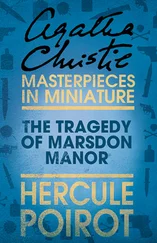Agatha Christie - Three Act Tragedy
Здесь есть возможность читать онлайн «Agatha Christie - Three Act Tragedy» весь текст электронной книги совершенно бесплатно (целиком полную версию без сокращений). В некоторых случаях можно слушать аудио, скачать через торрент в формате fb2 и присутствует краткое содержание. Жанр: Классический детектив, на английском языке. Описание произведения, (предисловие) а так же отзывы посетителей доступны на портале библиотеки ЛибКат.
- Название:Three Act Tragedy
- Автор:
- Жанр:
- Год:неизвестен
- ISBN:нет данных
- Рейтинг книги:4.5 / 5. Голосов: 2
-
Избранное:Добавить в избранное
- Отзывы:
-
Ваша оценка:
- 100
- 1
- 2
- 3
- 4
- 5
Three Act Tragedy: краткое содержание, описание и аннотация
Предлагаем к чтению аннотацию, описание, краткое содержание или предисловие (зависит от того, что написал сам автор книги «Three Act Tragedy»). Если вы не нашли необходимую информацию о книге — напишите в комментариях, мы постараемся отыскать её.
Three Act Tragedy — читать онлайн бесплатно полную книгу (весь текст) целиком
Ниже представлен текст книги, разбитый по страницам. Система сохранения места последней прочитанной страницы, позволяет с удобством читать онлайн бесплатно книгу «Three Act Tragedy», без необходимости каждый раз заново искать на чём Вы остановились. Поставьте закладку, и сможете в любой момент перейти на страницу, на которой закончили чтение.
Интервал:
Закладка:
Agatha Christie
Three Act Tragedy
1
Mr. Satterthwaite sat on the terrace of “Crow’s Nest” and watched his host, Sir Charles Cartwright, climbing up the path from the sea.
Crow’s Nest was a modern bungalow of the better type. It had no half timbering, no gables, no excrescences dear to a third-class builder’s heart. It was a plain white solid building – deceptive as to size, since it was a good deal bigger than it looked. It owed its name to its position, high up, overlooking the harbour of Loomouth. Indeed from one corner of the terrace, protected by a strong balustrade, there was a sheer drop to the sea below. By road Crow’s Nest was a mile from the town. The road ran inland and then zigzagged high up above the sea. On foot it was accessible in seven minutes by the steep fisherman’s path that Sir Charles Cartwright was ascending at this minute.
Sir Charles was a well-built, sunburnt man of middle age. He wore old grey flannel trousers and a white sweater. He had a slight rolling gait, and carried his hands half closed as he walked. Nine people out of ten would say, “Retired Naval man – can’t mistake the type.” The tenth, and more discerning, would have hesitated, puzzled by something indefinable that did not ring true. And then perhaps a picture would rise, unsought, the deck of a ship – but not a real ship – a ship curtailed by hanging curtains of thick rich material – a man, Charles Cartwright, standing on that deck, light that was not sunlight streaming down on him, the hands half clenched, the easy gait and a voice – the easy pleasant voice of an English sailor and gentleman, a great deal magnified in tone.
“No, sir,” Charles Cartwright was saying, “I’m afraid I can’t give you any answer to that question.”
And swish fell the heavy curtains, up sprang the lights, an orchestra plunged into the latest syncopated measure, girls with exaggerated bows in their hair said, Chocolates? Lemonade? The first act of The Call of the Sea , with Charles Cartwright as Commander Vanstone, was over.
From his post of vantage, looking down, Mr. Satterthwaite smiled.
A dried-up little pipkin of a man, Mr. Satterthwaite, a patron of art and the drama, a determined but pleasant snob, always included in the more important house-parties and social functions (the word “and Mr. Satterthwaite” appeared invariably at the tail of a list of guests.) Withal a man of considerable intelligence and a very shrewd observer of people and things.
He murmured now, shaking his head, “I wouldn’t have thought it. No, really, I wouldn’t have thought it.”
A step sounded on the terrace and he turned his head. The big grey-haired man who drew a chair forward and sat down had his profession clearly stamped on his keen, kindly, middle-aged face.
“Doctor” and “ Harley Street,” Sir Bartholomew Strange had succeeded in his profession. He was a well-known specialist in nervous disorders, and had recently received a knighthood in the Birthday Honours list.
He drew his chair forward beside that of Mr. Satterthwaite and said:
“What wouldn’t you have thought? “
With a smile Mr. Satterthwaite drew attention to the figure below rapidly ascending the path.
“I shouldn’t have thought Sir Charles would have remained contented so long in – er – exile.”
“By Jove, no more should I!” The other laughed, throwing back his head. “I’ve known Charles since he was a boy. We were at Oxford together. He’s always been the same – a better actor in private life than on the stage! Charles is always acting. He can’t help it – it’s second nature to him. Charles doesn’t go out of a room – he ‘makes an exit’ – and he usually has to have a good line to make it on. All the same, he likes a change of part – none better. Two years ago he retired from the stage – said he wanted to live a simple country life, out of the world, and indulge his old fancy for the sea. He comes down here and builds this place. His idea of a simple country cottage. Three bathrooms and all the latest gadgets! I was like you, Satterthwaite, I didn’t think it would last. After all, Charles is human – he needs his audience. Two or three retired captains, a bunch of old women and a parson – that’s not much of a house to play to. I thought the ‘simple fellow, with his love of the sea,’ would run for six months. Then, frankly, I thought he’d tire of the part. I thought the next thing to fill the bill would be the weary man of the world at Monte Carlo, or possibly a laird in the Highlands – he’s versatile, Charles is.”
The doctor stopped. It had been a long speech. His eyes were full of affection and amusement as he watched the unconscious man below. In a couple of minutes he would be with them.
“However,” Sir Bartholomew went on, “it seems we were wrong. The attraction of the simple life holds.”
“A man who dramatises himself is sometimes misjudged,” pointed out Mr. Satterthwaite. “One does not take his sincerities seriously.”
The doctor nodded.
“Yes,” he said thoughtfully. “That’s true.”
With a cheerful halloo Charles Cartwright ran up the steps on to the terrace.
“ Mirabelle surpassed herself,” he said. “You ought to have come, Satterthwaite.”
Mr. Satterthwaite shook his head. He had suffered too often crossing the Channel to have any illusions about the strength of his stomach afloat. He had observed the Mirabelle from his bedroom window that morning. There had been a stiff sailing breeze and Mr. Satterthwaite had thanked heaven devoutly for dry land.
Sir Charles went to the drawing-room window and called for drinks.
“You ought to have come, Tollie,” he said to his friend. “Don’t you spend half your life sitting in Harley Street telling your patients how good life on the ocean wave would be for them?”
“The great merit of being a doctor,” said Sir Bartholomew, “is that you are not obliged to follow your own advice.”
Sir Charles laughed. He was still unconsciously playing his part – the bluff breezy Naval man. He was an extraordinarily good-looking man, beautifully proportioned, with a lean humorous face, and the touch of grey at his temples gave him a kind of added distinction. He looked what he was – a gentleman first and an actor second.
“Did you go alone?” asked the doctor.
“No,” Sir Charles turned to take his drink from a smart parlourmaid who was holding a tray. “I had a ‘hand.’ The girl Egg, to be exact.”
There was something, some faint trace of self-consciousness in his voice which made Mr. Satterthwaite look up sharply.
“Miss Lytton Gore? She knows something about sailing, doesn’t she?”
Sir Charles laughed rather ruefully.
“She succeeds in making me feel a complete landlubber; but I’m coming on – thanks to her.”
Thought sipped quickly in and out of Mr. Satterthwaite’s mind.
“I wonder – Egg Lytton Gore – perhaps that’s why he hasn’t tired – the age – a dangerous age – it’s always a young girl at that time of life… ”
Sir Charles went on: “The sea – there’s nothing like it – sun and wind and sea – and a simple shanty to come home to.”
And he looked with pleasure at the white building behind him, equipped with three bathrooms, hot and cold water in all the bathrooms, the latest system of central heating, the newest electrical fittings and a staff of parlourmaid, housemaid, chef, and kitchenmaid. Sir Charles’s interpretation of simple living was, perhaps, a trifle exaggerated.
A tall and exceedingly ugly woman issued from the house and bore down upon them.
“Good morning, Miss Milray.”
Читать дальшеИнтервал:
Закладка:
Похожие книги на «Three Act Tragedy»
Представляем Вашему вниманию похожие книги на «Three Act Tragedy» списком для выбора. Мы отобрали схожую по названию и смыслу литературу в надежде предоставить читателям больше вариантов отыскать новые, интересные, ещё непрочитанные произведения.
Обсуждение, отзывы о книге «Three Act Tragedy» и просто собственные мнения читателей. Оставьте ваши комментарии, напишите, что Вы думаете о произведении, его смысле или главных героях. Укажите что конкретно понравилось, а что нет, и почему Вы так считаете.












